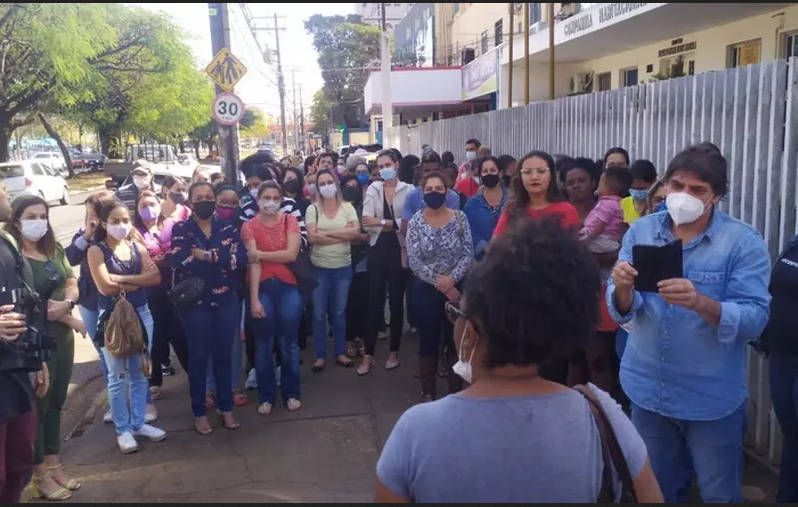We publish an unofficial translation of an article by A Nova Democracia (AND).
SP: Parents and teachers mobilise against the "restructuring" of early childhood education in Ribeirão Preto

Parents demonstrate against the attack on their children's education. Photo: Revide
The Municipal Education Secretariat (SME) of Ribeirão Preto (SP) published a decision on the restructuring of early childhood education in the Official Gazette on 6 July. The restructuring will reorganise the education of children aged 0 (zero) to 3 (three) years. The restructuring will increase the number of pupils per level, overloading teachers. The change through Decision No. 14/2022 was imposed by the Minister of Education without any consultation with the teachers and the families of the pupils. Such a measure is an attack on the right to education of infants and young children.
On 8 July, parents and teachers demonstrated against the Ribeirao Preto Municipal Secretariat's attack on Brazilian public education by organising an action at the Secretariat's entrance in Jardim Paulista.
The new action came at the time of the resumption of classes in the second semester, at a time when the opposing education government hoped not to encounter much resistance. However, there was a spontaneous mobilisation in which parents, guardians and teachers agreed to defend a public education system that serves the interests of the people. In this context, restructuring is denounced as direct interference by the state in the work of teachers with their classes, both in terms of the pedagogical aspect and the development of social and affective relations.
The government's attitude of ignoring the positions of parents and teachers was also partially adopted by parts of the leadership of the union of municipal employees of Ribeirão Preto, Guatapará and Pradópolis. In a month of "restructuring" in early childhood education, the body only did bureaucratic work, monitoring the schools during the restructuring to gather evidence for a lawsuit against the municipality, ignoring the organisation of parents and teachers. The union ignored the demands of the teachers themselves to widen the discussion on mobilisation against the "reorganisation". It was only after great pressure that a meeting was held on 3 August, almost a month after the resolution. It is clear that the delay affected workers' mobilisation against the attack. The alienation of the teachers and the disregard for the educational situation of their children have led to a general unease.
At the 03/08 meeting, the union leadership did not engage in discussion and simply proposed a strike. This lack of democracy was rejected by those present. During the pandemic and the resulting paralysis of education, the municipality put all the blame on the teachers themselves and diverted attention from the real culprits for the negligence in education: the Minister of Education and the Ministry of Education (MEC). This tactic of the government worked and the families eventually turned against the teachers. In this moment of renewed attack, with families siding with teachers and willing to do anything to prevent changes that harm children's education, those present pointed out that going on strike means leaving families alone again and at the mercy of the government's lame excuses.
A teacher present made the counter-proposal to hold a one-day strike. The proposal was accepted by their colleagues. However, the union did not allow other workers to speak or take a position and only defended the need for a quick meeting, preventing full democracy in the area of discussion and definitions. Those present spoke out against the union's position and a debate ensued. The union's leadership interrupted the meeting for 10 minutes to discuss and when they returned, they expressed the view that a strike or a one-day work stoppage would not make much difference. They also pointed out that the meeting should decide on a strike as an indicator of compliance with the 72 hours legislation and the next meeting will decide whether there will be a strike or a walkout.
New discussions will take place and parents and teachers must remain united so that the struggle against the government's attacks on early childhood education can guarantee both the right to public education, free and quality education for children, and dignified working conditions, against overcrowding and precarious teaching. A fighting union is an instrument of struggle that expresses the demands of the category and must be linked to the aspirations of the masses of workers in order to direct the mobilisations and also reach out to other workers to explain the situation and unite them in the struggle for rights. In order to achieve its goals, it must be prepared to draw the final consequences.
